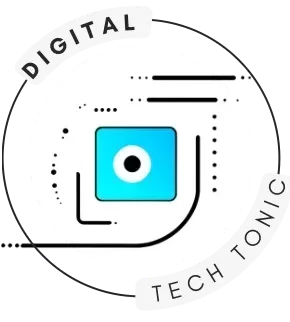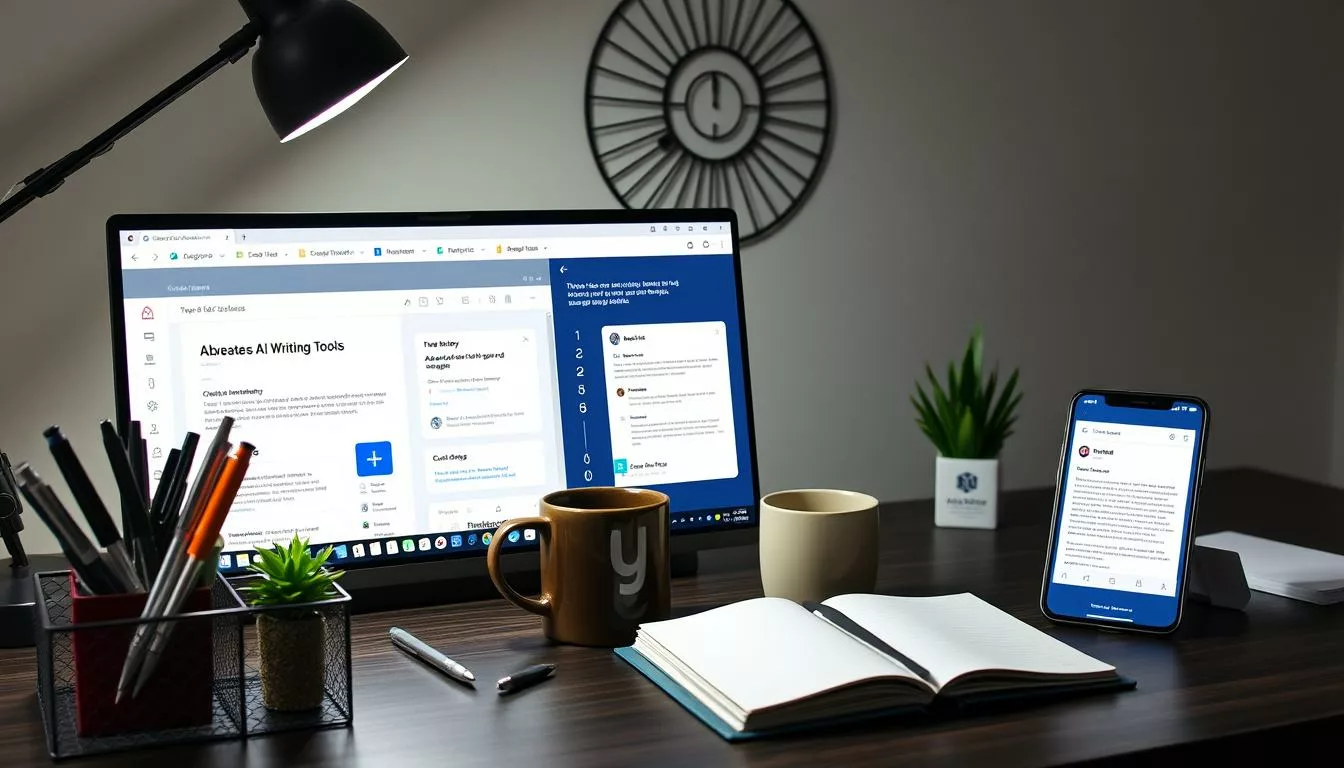Micro businesses often struggle with creating legal notices that are both compliant and effective. With the rise of AI technology, these businesses can now leverage AI writing tools to streamline this process.
These innovative tools can help micro businesses generate high-quality legal notices without the need for extensive legal expertise. By utilizing free AI writing tools, businesses can save time and resources, allowing them to focus on growth and development.
Key Takeaways
- AI writing tools can simplify the process of creating legal notices for micro businesses.
- These tools can help reduce the need for extensive legal knowledge.
- Micro businesses can save time and resources by using AI writing tools.
- Free AI writing tools are available for businesses to utilize.
- Effective legal notices are crucial for micro businesses to operate compliantly.
The Legal Documentation Challenge for Micro Businesses
The process of generating legal documents poses a significant challenge for small operations. Micro businesses often lack the resources and expertise to efficiently create and manage the legal notices they require.
Common Legal Notices Required for Small Operations
Micro businesses need various legal notices to operate legally and protect their interests. These include:
- Privacy policies
- Terms of service
- Disclaimers
- Liability waivers
Having these documents in place is crucial for compliance with regulations and for establishing clear relationships with customers and partners.
The Cost and Time Burden of Traditional Legal Documentation
Traditional methods of creating legal documents can be both costly and time-consuming. Law firms and legal professionals often charge high rates for drafting customized legal notices.
| Aspect | Traditional Method | Potential AI Solution |
|---|---|---|
| Cost | High (lawyer fees) | Low (automated tools) |
| Time | Several days or weeks | Minutes or hours |
| Customization | High (tailored to business) | Variable (dependent on tool) |
The table highlights the differences between traditional legal documentation methods and potential AI-driven solutions. By adopting AI writing tools, micro businesses can significantly reduce the cost and time associated with legal documentation.
How AI Writing Tools Transform Legal Documentation
The advent of AI writing tools has transformed the landscape of legal documentation, making it more efficient and accessible. This transformation is crucial for micro businesses that need to create legal documents without incurring significant costs or requiring extensive legal expertise.
Time and Cost Efficiency Benefits
AI writing tools significantly reduce the time and cost associated with creating legal documents. By automating the drafting process, these tools enable businesses to generate documents quickly, allowing them to focus on other critical tasks.
| Benefits | Traditional Methods | AI Writing Tools |
|---|---|---|
| Time Efficiency | Several hours or days | Minutes |
| Cost | High legal fees | Minimal or no additional cost |
Accuracy and Compliance Advantages
AI writing tools are designed to ensure accuracy and compliance with relevant laws and regulations. They can update documents in real-time to reflect changes in legislation, reducing the risk of non-compliance.
Key advantages include:
- Automated updates to reflect legal changes
- Reduced risk of human error
- Consistency across documents
Accessibility for Non-Legal Professionals
AI writing tools make it possible for non-legal professionals to create legal documents without needing extensive legal knowledge. This accessibility empowers micro businesses to manage their legal documentation needs internally.
Essential Legal Notices Every Micro Business Needs
Understanding and implementing the necessary legal notices is a critical step for micro businesses to establish a legally sound foundation. These documents not only protect the business from potential legal issues but also foster trust with customers and partners.
Privacy Policies and Data Protection Statements
A privacy policy is crucial for any business that handles customer data. It outlines how the business collects, uses, and protects customer information. For micro businesses, having a clear and concise privacy policy can enhance customer trust and comply with data protection regulations.
Terms of Service and User Agreements
Terms of Service (ToS) and user agreements define the relationship between the business and its customers or users. These documents outline the rules, guidelines, and expectations for using the business’s services or products, protecting the business from potential disputes.
Disclaimers and Liability Waivers
Disclaimers and liability waivers are essential for limiting a business’s liability in various situations. They can protect micro businesses from unforeseen circumstances and clarify the extent of their responsibility.
Employment and Contractor Documents
For micro businesses with employees or contractors, having the right employment and contractor documents is vital. These include employment contracts, non-disclosure agreements, and independent contractor agreements, which help define roles, responsibilities, and expectations.
AI Writing Tools for Micro Business Legal Notices Free of Charge
The advent of free AI writing tools has revolutionized the way micro businesses handle legal documentation. These innovative solutions enable small operations to generate essential legal notices without the burden of high costs or the need for extensive legal expertise.
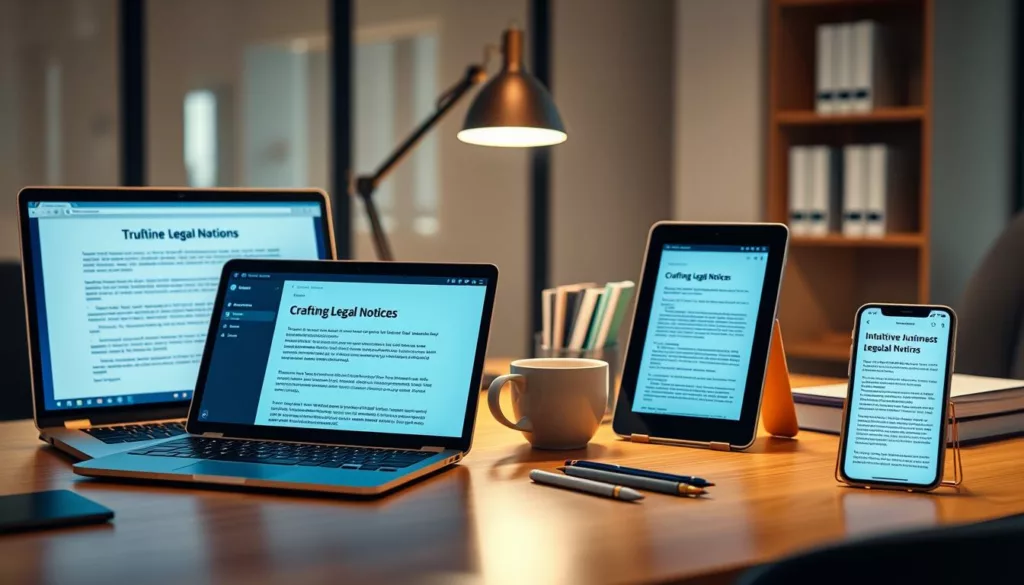
Rytr’s Free Legal Document Features
Rytr offers a range of free features for creating legal documents, making it an attractive option for micro businesses. With Rytr, users can generate high-quality legal notices using AI-powered templates.
HyperWrite’s No-Cost Legal Templates
HyperWrite provides no-cost legal templates that can be customized to suit the specific needs of micro businesses. This tool simplifies the process of creating legal notices, ensuring compliance and accuracy.
WriteSonic’s Free Trial for Legal Content
WriteSonic offers a free trial for its legal content generation capabilities. During the trial period, micro businesses can access AI-powered legal notice creation tools, allowing them to experience the benefits firsthand.
Free AI Legal Document Generators
In addition to the tools mentioned above, there are various free AI legal document generators available that cater specifically to the needs of micro businesses. These generators use advanced algorithms to produce legally compliant documents.
By leveraging these AI writing tools, micro businesses can ensure they have the necessary legal notices in place, protecting their interests and complying with relevant regulations. It’s essential to explore the features and limitations of each tool to determine the best fit for your business needs.
ChatGPT for Customizable Legal Templates
ChatGPT offers a cutting-edge solution for micro businesses seeking to create customizable and legally compliant templates. This AI tool is transforming the landscape of legal documentation by providing efficient, accurate, and adaptable solutions.
Free vs. Paid Features for Legal Document Creation
ChatGPT’s legal template generation capabilities come with both free and paid features. The free version allows users to create basic legal documents, which can be a good starting point for small micro businesses with simple legal needs. However, for more complex legal requirements, the paid version offers advanced features such as more detailed templates, customization options, and the ability to generate more complex legal documents.
Key differences between free and paid features include:
- Depth of customization
- Complexity of legal documents
- Additional support options
| Feature | Free Version | Paid Version |
|---|---|---|
| Customization Depth | Limited | Advanced |
| Document Complexity | Basic | Complex |
| Support Options | Community Support | Dedicated Support |
Step-by-Step Guide to Generating Legal Notices
To generate legal notices using ChatGPT, follow these steps:
- Define your legal notice requirements
- Input your specific details into ChatGPT
- Review and customize the generated template
- Finalize and download your legal notice
Example: For a privacy policy, you would input details about your business data handling practices, and ChatGPT would generate a tailored privacy policy template.
Best Practices for Prompt Engineering
Effective prompt engineering is crucial for generating high-quality legal templates with ChatGPT. Here are some best practices:
- Be specific about your legal needs
- Provide detailed context
- Use clear and concise language
Example Prompts for Different Legal Notices
Here are some example prompts for generating different legal notices:
- For a terms of service: “Create a terms of service agreement for an e-commerce platform selling digital goods.”
- For a disclaimer: “Generate a disclaimer for a financial advisory blog.”
By following these guidelines and utilizing ChatGPT’s capabilities, micro businesses can efficiently create customized legal templates that meet their specific needs.
Claude AI’s Legal Documentation Capabilities
Advanced legal documentation is now more achievable than ever with Claude AI. This AI tool is transforming the way legal documents are created, making it easier for micro businesses to access professional-grade legal notices.
Free Access Options and Limitations
Claude AI offers free access to its legal documentation features, allowing businesses to create legal notices without incurring significant costs. However, there are limitations to the free version, including restricted document complexity and limited customization options.
Legal Reasoning Strengths
One of Claude AI’s standout features is its legal reasoning capability. This allows the AI to understand the context and nuances of legal documents, generating content that is not only accurate but also relevant to the specific needs of the business.
Document Formatting Features
Claude AI also excels in document formatting, providing users with professionally structured legal documents. The AI can adapt to various document types, ensuring compliance with legal standards.
Comparison with Other AI Tools
A comparison of Claude AI with other AI tools reveals its unique strengths. The following table highlights how Claude AI stacks up against its competitors in terms of legal documentation capabilities.
| Feature | Claude AI | Ryte | HyperWrite |
|---|---|---|---|
| Free Access | Yes | Limited | Yes |
| Legal Reasoning | Advanced | Basic | Advanced |
| Document Formatting | Professional | Standard | Professional |
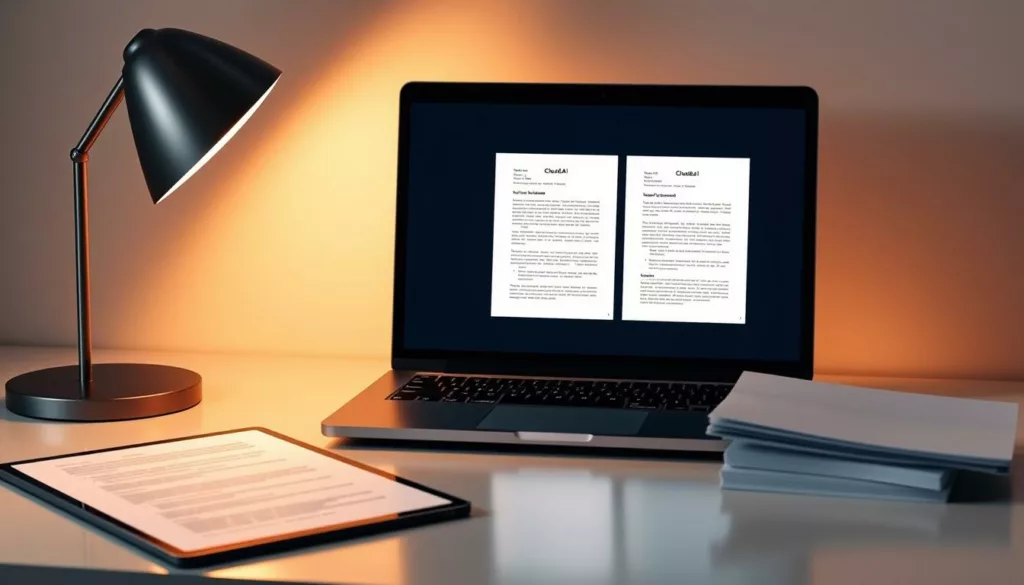
Jasper AI for Professional-Grade Legal Content
Professional-grade legal content is now accessible to micro businesses through Jasper AI’s advanced technology. Jasper AI is designed to streamline the process of creating legal documents, making it more efficient and cost-effective.
Free Trial Options and Pricing
Jasper AI offers a free trial, allowing businesses to test its capabilities before committing to a paid plan. The pricing structure is designed to be competitive and scalable for micro businesses.
Legal Templates and Frameworks
Jasper AI provides a range of legal templates and frameworks that cater to various business needs. These templates are designed to be customizable, ensuring that businesses can tailor their legal documents accordingly.
Compliance Checking Features
One of the standout features of Jasper AI is its compliance checking capability. This ensures that the generated legal content adheres to relevant laws and regulations, reducing the risk of non-compliance.
Integration with Other Business Tools
Jasper AI is designed to integrate seamlessly with other business tools, enhancing its utility and streamlining workflows. This integration capability makes it an ideal solution for micro businesses looking to optimize their operations.
| Feature | Description | Benefit |
|---|---|---|
| Free Trial | Test Jasper AI’s capabilities before purchasing | Risk-free assessment |
| Legal Templates | Customizable templates for various legal documents | Time-saving and efficient |
| Compliance Checking | Ensures legal content adheres to relevant laws | Reduced risk of non-compliance |
| Integration | Seamless integration with other business tools | Streamlined workflows |
By leveraging Jasper AI’s advanced features, micro businesses can create professional-grade legal content with ease, ensuring compliance and efficiency in their legal documentation processes.
Copy.ai’s Legal Notice Generation Tools
Legal notice creation just got easier with Copy.ai’s innovative AI tools for micro businesses. Copy.ai offers a streamlined solution for generating legal notices, making it an invaluable resource for small operations.
Free Plan Limitations and Capabilities
Copy.ai’s free plan provides a robust starting point for micro businesses. While it comes with certain limitations, it allows users to generate a significant number of legal notices. The free plan is particularly useful for businesses with basic legal documentation needs.
Specialized Legal Templates
Copy.ai boasts an impressive library of specialized legal templates. These templates are designed to cater to various legal notice requirements, ensuring that micro businesses can find the right documentation for their needs.

User Interface Advantages
The user-friendly interface of Copy.ai makes it accessible even to those without extensive legal knowledge. This ease of use significantly reduces the time and effort required to generate legal notices.
Real-World Usage Examples
Many micro businesses have successfully utilized Copy.ai for their legal notice generation needs. For instance, a small e-commerce business might use Copy.ai to create a comprehensive privacy policy, while a freelance service provider could generate a professional terms of service agreement.
| Feature | Free Plan | Paid Plan |
|---|---|---|
| Legal Templates | 50+ | 500+ |
| Notice Generation | Unlimited | Unlimited |
| Customization Options | Limited | Advanced |
By leveraging Copy.ai’s legal notice generation tools, micro businesses can ensure they have the necessary legal documentation in place, all while saving time and resources.
Legal-Specific AI Tools: DoNotPay and Legal Robot
Legal-specific AI tools are transforming the way micro businesses handle legal notices, with platforms like DoNotPay and Legal Robot leading the charge. These tools are designed to simplify the complex process of creating legal documents, making it more accessible and affordable for small operations.
Free vs. Paid Features
Both DoNotPay and Legal Robot offer a mix of free and paid features to cater to different business needs. DoNotPay, for instance, provides a range of free services, including assistance with legal document generation. However, more complex tasks may require a subscription to their premium service.
Legal Robot, on the other hand, offers a free trial for its legal document automation platform. After the trial period, businesses can choose from various paid plans based on their requirements.
| Feature | DoNotPay | Legal Robot |
|---|---|---|
| Free Services | Limited legal document generation | Free trial available |
| Paid Services | Premium subscription for advanced features | Various paid plans post-trial |
Specialized Legal Document Generation
DoNotPay specializes in generating a wide range of legal documents, from consumer protection notices to employment-related documents. Its AI is trained on a vast dataset of legal templates, ensuring that the generated documents are comprehensive and legally relevant.
Legal Robot focuses on automating legal document creation through its sophisticated AI algorithms. It allows businesses to customize documents according to their specific needs, ensuring compliance with relevant laws and regulations.
“Using DoNotPay has been a game-changer for our business. The legal documents generated are not only comprehensive but also tailored to our specific needs.” – Emily R., Small Business Owner
Compliance Verification Capabilities
Both platforms emphasize compliance verification, ensuring that the generated legal documents adhere to current laws and regulations. DoNotPay achieves this through its extensive legal template database, while Legal Robot uses AI to analyze and adapt documents for compliance.
User Reviews and Success Stories
Users of both platforms have reported significant time savings and reduced legal costs. For instance, a review on Trustpilot praises DoNotPay for its ease of use and effectiveness in handling legal notices. Similarly, Legal Robot has received positive feedback for its intuitive interface and the quality of its generated documents.
- DoNotPay: 4.5/5 stars on Trustpilot, praised for ease of use and effectiveness.
- Legal Robot: 4.8/5 stars on G2, commended for its intuitive interface and document quality.
By leveraging these legal-specific AI tools, micro businesses can ensure they are meeting legal requirements without the burden of extensive legal fees, marking a significant step forward in making legal compliance more accessible.
Ensuring Legal Compliance When Using AI-Generated Notices
As micro businesses increasingly rely on AI writing tools for legal documentation, ensuring compliance with legal requirements becomes paramount. AI-generated notices can streamline legal processes, but they must adhere to various legal standards.
State-Specific Legal Requirements
Different states have unique legal requirements that AI-generated notices must comply with. For instance, California’s Consumer Privacy Act (CCPA) imposes specific obligations on businesses handling consumer data. Micro businesses operating in multiple states must ensure their AI-generated notices meet the most stringent requirements applicable to them.
Industry-Specific Regulations
Various industries are subject to specific regulations that AI-generated legal notices must adhere to. For example, businesses in the healthcare sector must comply with HIPAA regulations regarding patient privacy. Understanding these industry-specific regulations is crucial for ensuring legal compliance.
When to Consult a Professional
While AI tools can generate legal notices, there are situations where consulting a legal professional is advisable. Complex legal matters or high-stakes documents require expert review to ensure they are legally binding and compliant.
Verification Checklist for AI-Generated Documents
- Review state-specific legal requirements
- Check for industry-specific regulations
- Verify accuracy of generated content
- Consult a legal professional for complex matters
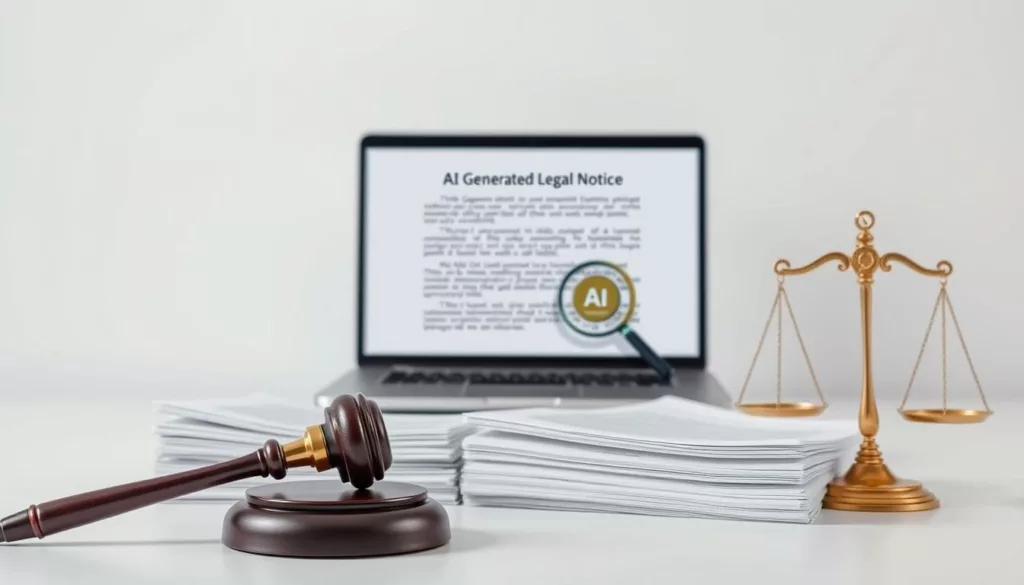
By following these guidelines and utilizing AI-generated notices judiciously, micro businesses can ensure legal compliance while benefiting from the efficiency of AI writing tools.
Customizing AI-Generated Legal Notices for Your Business
AI-generated legal notices offer a solid foundation, but customization is key to ensuring they meet the unique requirements of each business. To effectively utilize these notices, businesses must tailor them to their specific needs and circumstances.
Essential Business Information to Include
When customizing AI-generated legal notices, it’s crucial to include essential business information. This includes the business name, address, and contact details. Accurate information ensures that the legal notices are valid and enforceable.
Industry-Specific Adaptations
Different industries have unique legal requirements. For instance, healthcare businesses must comply with HIPAA regulations, while e-commerce businesses need to adhere to consumer protection laws. Industry-specific adaptations are vital to ensure compliance.
Regular Update Protocols
Legal requirements and regulations change frequently. Regular update protocols are necessary to keep legal notices current and compliant. This involves reviewing and revising legal documents periodically.
Implementation Timeline and Process
To implement customization and regular updates effectively, businesses should establish a clear timeline and process. This includes:
- Reviewing AI-generated legal notices for accuracy and relevance
- Customizing the notices to include business-specific information and industry-specific requirements
- Scheduling regular reviews and updates to ensure ongoing compliance
By following these steps and maintaining a proactive approach to legal compliance, micro businesses can effectively utilize AI-generated legal notices to protect their interests and ensure regulatory compliance.
Common Pitfalls When Using AI for Legal Documentation
While AI tools offer significant advantages in generating legal documents, there are several pitfalls to be aware of when leveraging these technologies. Understanding these challenges is crucial for micro businesses to effectively utilize AI for their legal documentation needs.
Outdated Legal Information
One of the primary concerns is the potential for AI tools to provide outdated legal information. Laws and regulations are constantly evolving, and AI models may not always have access to the most current data.
Overly Generic Content
AI-generated documents can sometimes be too generic, failing to account for the specific nuances of a business’s legal requirements. This can lead to documents that are not fully applicable or compliant with relevant laws.
Missing Critical Clauses
Another pitfall is the omission of critical clauses necessary for comprehensive legal coverage. AI tools may not always include the specific clauses required by a particular business or industry.
Over-Reliance on Automation
There’s also the risk of over-reliance on automation without adequate human oversight. While AI can streamline document creation, it’s essential to review and customize the generated content to ensure it meets the business’s specific needs.
| Pitfall | Description | Mitigation Strategy |
|---|---|---|
| Outdated Legal Information | AI models may not always have the most current legal data. | Regularly update AI tools and verify information against current laws. |
| Overly Generic Content | Documents may not fully address specific business needs. | Customize AI-generated documents to fit your business requirements. |
| Missing Critical Clauses | Omission of necessary clauses for legal coverage. | Review documents carefully to ensure all necessary clauses are included. |
| Over-Reliance on Automation | Lack of human oversight in document creation. | Implement a review process to ensure AI-generated content is accurate and appropriate. |
Conclusion: Balancing AI Efficiency with Legal Diligence
As micro businesses navigate the complex landscape of legal documentation, AI writing tools offer a promising solution. By leveraging AI efficiency, small operations can streamline the process of creating essential legal notices, reducing both time and costs associated with traditional methods.
However, it’s crucial to balance this efficiency with legal diligence. Ensuring that AI-generated documents comply with relevant laws and regulations is paramount. This involves understanding state-specific legal requirements, industry-specific regulations, and the need for regular updates to maintain compliance.
By combining the benefits of AI writing tools with careful legal oversight, micro businesses can protect their interests while maintaining operational efficiency. Tools like Rytr, HyperWrite, and Jasper AI provide robust solutions for generating legal notices, but it’s essential to review and customize the output to meet specific business needs.
Ultimately, balancing AI efficiency with legal diligence enables micro businesses to confidently manage their legal documentation, focusing on growth and development while minimizing legal risks.
FAQ
What are the benefits of using AI writing tools for creating legal notices?
AI writing tools offer time and cost efficiency, improve accuracy and compliance, and make legal documentation more accessible to non-legal professionals.
Are AI-generated legal notices compliant with state-specific and industry-specific regulations?
AI-generated legal notices can be tailored to comply with state-specific and industry-specific regulations, but it’s essential to verify their accuracy and consult a professional when necessary.
Can AI writing tools like Rytr, HyperWrite, and WriteSonic be used for free?
Yes, AI writing tools like Rytr, HyperWrite, and WriteSonic offer free services or trials for creating legal notices, but their free features may be limited.
How can I customize AI-generated legal notices for my micro business?
To customize AI-generated legal notices, include essential business information, make industry-specific adaptations, and regularly update the documents to ensure they remain relevant and compliant.
What are the common pitfalls when using AI for legal documentation?
Common pitfalls include using outdated legal information, generating overly generic content, missing critical clauses, and over-relying on automation, which can be mitigated by verifying the accuracy of AI-generated documents and consulting professionals when necessary.
How do I ensure the legal compliance of AI-generated notices?
To ensure legal compliance, verify AI-generated notices against state-specific and industry-specific regulations, and consult a professional when necessary.
What are the advantages of using ChatGPT for creating customizable legal templates?
ChatGPT offers free and paid features for creating customizable legal templates, and its step-by-step guide can help generate legal notices, while best practices for prompt engineering can improve the accuracy of the generated content.
Can Claude AI and Jasper AI be used for professional-grade legal content creation?
Yes, Claude AI and Jasper AI can be used for creating professional-grade legal content, with features like legal reasoning strengths, document formatting, and compliance checking.
How do legal-specific AI tools like DoNotPay and Legal Robot compare to general AI writing tools?
Legal-specific AI tools like DoNotPay and Legal Robot offer specialized document generation and compliance verification capabilities, making them more suitable for complex legal tasks, while general AI writing tools are more versatile but may require more customization.
